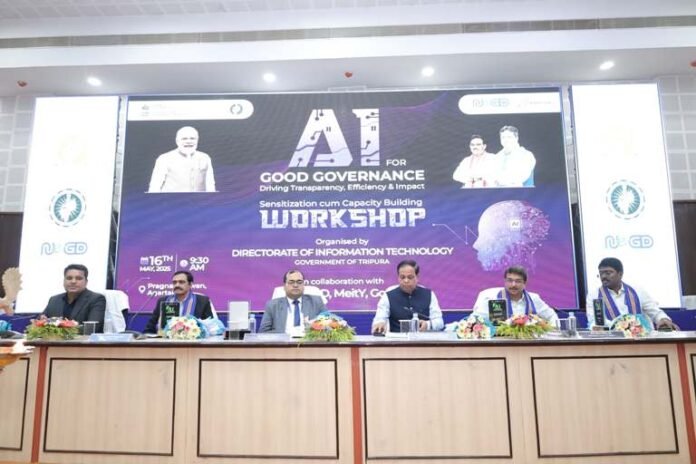Tripura has stepped boldly into the future by integrating Artificial Intelligence (AI) into its administrative framework, marking a pivotal move toward transparency and efficiency in governance. With a focus on improving public service delivery and minimizing human error, the state is laying down a roadmap that could soon become a model for other Northeastern states.
The implementation of AI is being hailed as a game-changer by officials, who believe it will reduce bureaucratic delays and bring more precision to decision-making. Departments ranging from revenue to health and education are expected to undergo significant transformation through AI-powered data analytics, digital monitoring tools, and predictive systems.
Chief Minister Dr. Manik Saha has described the move as a crucial step in delivering timely services and bridging the gap between citizens and the administration. “AI has the power to reduce red tape and make governance people-centric. Our goal is to ensure that every citizen of Tripura benefits from this digital transformation,” said the Chief Minister during a recent press interaction.
AI Tool Training
Tripura’s administrative officers have already begun undergoing training in AI tools and data analytics to equip themselves with the required skills. Pilot projects have commenced in select districts, focusing on grievance redressal, automated workflow systems, and smart resource allocation. One of the primary aims is to streamline public welfare schemes and monitor their implementation in real time.
The initiative is being supported by NITI Aayog and the Ministry of Electronics and Information Technology. A dedicated Task Force on AI implementation has been set up to ensure coordinated execution across various departments. The Task Force will also assess ethical concerns, data privacy norms, and cyber security protocols, ensuring that Tripura’s digital push remains responsible and inclusive.
AI is also being used to predict infrastructure requirements, identify bottlenecks in service delivery, and aid in faster decision-making through accurate data modeling. For instance, by analyzing footfall and demand patterns, AI tools are helping local municipalities optimize urban planning, reduce waste, and improve sanitation coverage.
A significant focus is also being placed on using AI in the agricultural sector. AI-based satellite mapping and drone surveillance are being deployed to monitor crop health, forecast yield, and recommend tailored interventions to farmers. This is expected to directly benefit the state’s agrarian population, empowering them with timely insights and improving productivity.
In the education sector, AI-backed platforms are being tested to provide personalized learning modules to students in rural areas. These adaptive tools assess a student’s performance and suggest customized study plans, aiming to bridge learning gaps. Schools are also exploring facial recognition for attendance tracking, ensuring real-time records and reducing manual errors.
Healthcare, too, is witnessing the early benefits of AI. Predictive algorithms are being tested to identify disease trends and send alerts to health departments for preventive action. Chatbots and virtual assistants are being considered for telemedicine services in remote locations, expanding the reach of doctors and medical professionals.
The Chief Minister has emphasized that the AI push will not replace human jobs but will enhance human productivity and reduce the burden of repetitive tasks. “This is about empowering our government staff with intelligent tools so they can focus on policy, innovation, and outreach,” said Dr. Saha.
Experts suggest that Tripura’s move is timely, especially as digital infrastructure improves and more states begin embracing smart governance solutions. With strong political will and technical support, the state is set to emerge as a front-runner in digital administration in the Northeast.
The government has urged citizens to actively participate in this transition. Feedback portals, app-based service tracking, and AI-integrated helplines are being encouraged so that the administration remains responsive to public needs. The involvement of civil society and academia is also being sought to shape AI policies that are inclusive and ethical.
Tripura’s digital leap, rooted in transparency and innovation, reflects its ambition to modernize without losing touch with grassroots realities. With continued support from the Centre and partnerships with tech experts, the state is poised to unlock the full potential of AI, making governance smarter, swifter, and citizen-focused.
Click here for more relevant articles.




